Keeping your horse safe from infectious disease

Horse owners must be vigilant about monitoring their horses’ health and maintaining it through good husbandry, health care and biosecurity practices.
Biosecurity is particularly important if you routinely take your horse off your property to events, but even those horses who do not frequently travel can be exposed to disease agents on equipment, hands and clothing that have been in contact with other horses.
Steps we encourage all horse owners to follow that will help prevent the spread of contagious disease:
- Do not bring your horse to an equestrian event or new stabling facility if your horse has active or recent signs of a potential infectious disease. This includes nasal discharge, cough, fever, diarrhea or enlarged lymph nodes. If your horse has recently been ill, AVOID attending equestrian events, adding new horses to your barn, or moving your horse from its current housing for at least three weeks past resolution of all clinical symptoms.
- While participating at equestrian events, or in the first few days in a new facility, monitor your horse’s rectal temperature twice daily, using a dedicated thermometer for each horse. Notify the veterinarian on call and the barn manager if your horse develops fever or any of the signs listed above.
- Do not put horses in stalls that have not been properly cleaned and disinfected between uses.
- Avoid tying up your horse in common areas and commingling near areas for disposal of manure or soiled bedding at events or clinics. Consider grazing in low traffic areas. Avoid nose to nose contact with other horses and letting other people pet, feed or touch your horse. Keep your contact with other horses at an event limited.
- Wash your hands frequently. Supply a 65-70 percent alcohol gel hand sanitizer for your stall area. Use frequently and allow 10 seconds of contact time for gel hand sanitizers.
- Avoid sharing group water troughs, and do not let your horse drink from the hose. Do not submerge the hose nozzle in the water when refilling water buckets.
- Label your horse’s belongings, and DO NOT SHARE buckets, manure forks, tack, bridles, halters, saddle pads, brushes, lip chains, twitches or oral paste medications.
- Bring your own equipment to events. Have separate water buckets, feed tubs, water hoses and stall cleaning equipment designated for travel. Clean and disinfect all equipment taken to the event including water buckets, stall cleaning equipment and wheel barrows (including wheels). Do not put this equipment back into the general circulation at your farm when returning home.
- Clean and disinfect your truck and trailer after use, including the tires. If you hire a transporter, ask when the trailer was last disinfected.
- Ask event/barn managers if they have any health requirements for animals to be on their premises and which biosecurity protocols they have in place. Ensure those practices are satisfactory to you before deciding to have your horse there.
- Ask visitors to your barn to use a footbath or wear boot covers and clean clothes. They should wash/disinfect their hands before entering and you should enquire as to whether they have recently been in any other barns.
No biosecurity plan will ever make commingling of horses 100% safe from disease transmission. Biosecurity should be used in conjunction with other health precautions (such as appropriate vaccines) on the advice of your veterinarian.
Source: Veterinary Health Centre, University of Missouri
Resources:
- Biosecurity Toolkit for Equine Events, California Department of Food & Agriculture
- Horse Events: Biosecurity guidelines for organizers and competitors, Alberta Equestrian Federation
For more information, contact:
Dr. Jill Wood
Chief Provincial Veterinarian
PEI Department of Agriculture
jswood@gov.pe.ca